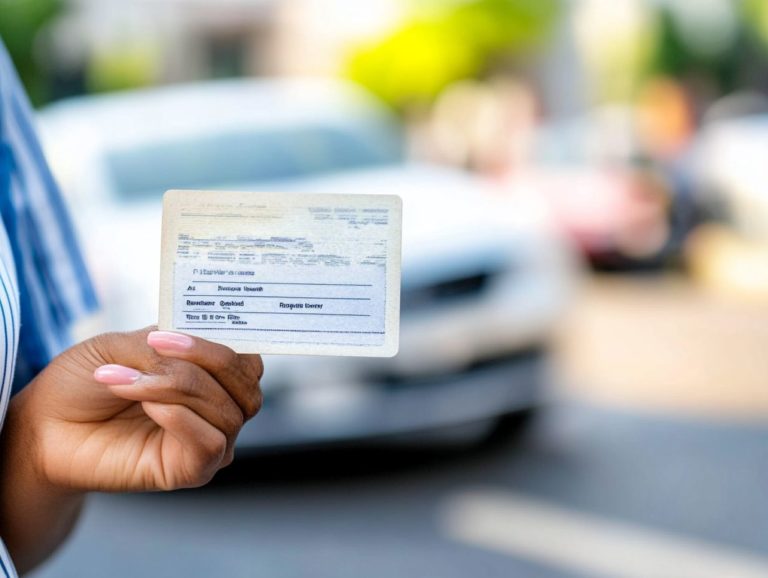How Are Auto Insurance Rates Determined?
Auto insurance rates can sometimes seem like a puzzle, leaving you wondering how those costs are actually calculated. Understanding the factors that influence these rates is essential for making informed decisions and potentially saving money.
From personal details and vehicle characteristics to geographical influences, a variety of elements come into play. This article delves into the complexities behind auto insurance pricing, provides strategies to help you lower your rates, and emphasizes the importance of comparing options.
Keep reading to discover how you can take charge of your insurance costs.
Contents
- Key Takeaways:
- Understanding Auto Insurance Rates
- Factors That Affect Auto Insurance Rates
- How to Lower Your Auto Insurance Rates
- Comparing Auto Insurance Rates
- Frequently Asked Questions
- What factors influence auto insurance rates?
- How does my driving record affect my auto insurance rates?
- Do insurance rates vary by location?
- What role does my age play in determining my auto insurance rates?
- How do different coverage options affect my auto insurance rates?
- Can I lower my auto insurance rates?
Key Takeaways:

- Auto insurance rates are determined by a combination of personal, vehicle, and location factors.
- You can lower your auto insurance rates by being a responsible driver, choosing a safe vehicle, and taking advantage of discounts.
- It’s important to shop around and compare auto insurance rates from multiple providers to ensure you’re getting the best coverage for the best price.
Understanding Auto Insurance Rates
Understanding auto insurance rates is crucial for you as a driver seeking optimal coverage while effectively managing your costs. Your driving record, claims history, and credit score all affect your insurance costs and are crucial for determining how much you pay.
Factors like how you use your vehicle, your location, and the types of coverage you choose such as liability coverage (which helps pay for damages to others in an accident you cause) also play important roles in your final premium. Insurance trends can vary by state due to differing regulations and requirements, so it s essential to stay informed to make the best decisions for your needs.
What Determines Your Premium?
Your auto insurance costs hinge on various factors, including your driving record, claims history, and credit score, which offers insights into your overall risk level as a policyholder.
Additionally, personal characteristics like your age, gender, and marital status can shape your insurance costs. For example, younger drivers often encounter higher prices due to their lack of experience, while married individuals frequently enjoy discounts that reflect a lower risk profile.
Your driving history is scrutinized closely; a clean record can lead to substantial savings. The type of vehicle you own also influences your rates, with certain models qualifying for discounts based on their safety features and overall reliability.
Factors That Affect Auto Insurance Rates
Several key factors can significantly influence your auto insurance rates. These include personal attributes, such as your driving behavior and location, as well as vehicle-specific characteristics like the model and its safety features. To learn more, explore what factors affect my auto insurance rate?
Personal Factors

Personal factors like your driving record, credit score, and demographic details such as your age and marital status play a crucial role in shaping your auto insurance rates.
These elements not only influence the base premium but also impact how insurers perceive risk. A clean driving history with no accidents or traffic violations can help you enjoy significantly lower rates, reflecting responsible behavior on the road.
Statistics reveal that even a single accident can cause your premiums to surge by an average of 20 to 50%.
A solid credit score can also translate into premium discounts, as insurers generally interpret it as a sign of financial responsibility. Research indicates that policyholders with excellent credit scores could save up to 30% on their premiums compared to those with poor credit.
Additionally, demographic factors like being married or falling within a particular age bracket can further refine your rates, demonstrating just how intricate the determination of insurance costs can be.
Vehicle Factors
The model of your vehicle, its safety features, and your driving habits play a pivotal role in shaping your auto insurance rates. Insurance companies evaluate the risk associated with each type of vehicle.
For instance, if you drive a newer model equipped with advanced safety technologies, you re likely to enjoy lower premiums. This is thanks to the reduced chances of accidents. Similarly, having a solid claims history suggests that you re a less risky driver. This can translate into lower costs for you.
You might also notice stark differences in insurance rates stemming from your location. If you live in an urban area, your vehicle may face higher premiums due to increased traffic and a greater likelihood of theft. In contrast, rural vehicles typically enjoy lower rates, reflecting fewer claims.
How you use your vehicle also impacts your insurance costs. Whether it s primarily for daily commuting or leisurely weekend drives can significantly determine your overall insurance expenses.
Location Factors
Location factors are crucial in shaping your auto insurance rates. City dwellers might notice higher premiums compared to their rural counterparts. This difference is largely due to the increased risk and elevated claims rates associated with urban driving.
This higher cost stems from the sheer number of vehicles on the road. These factors lead to a greater likelihood of accidents, theft, and vandalism in metropolitan areas. Take Texas, for example. With sprawling cities like Houston and Dallas, insurers often adjust their rates to account for the higher probability of claims. Meanwhile, those living in rural areas typically enjoy more favorable rates.
In Florida, legislation requires that all drivers carry Personal Injury Protection (PIP). This means residents may face different insurance obligations compared to states with varied coverage requirements. Understanding how your geographic location can significantly influence your insurance experience and budget is essential.
How to Lower Your Auto Insurance Rates
You can lower your auto insurance rates by employing various effective tips and strategies. Focus on enhancing your driving behavior, take advantage of available insurance discounts, and keep your claims history pristine.
Each approach can significantly contribute to reducing your overall premiums while ensuring you remain a responsible driver.
Tips and Strategies

Implementing effective tips and strategies can lead to significant insurance discounts. This is especially true for those who demonstrate safe driving habits and are willing to adjust their deductible amounts. A deductible is the amount you pay out of pocket before insurance kicks in.
By enrolling in recognized driving courses, you not only enhance your skills but also position yourself for lower premiums. Many insurance providers appreciate the value of a comprehensive education in road safety.
Regularly reviewing available policy options enables you to pinpoint competitive rates. You can customize coverage to fit your unique circumstances. Adjusting your deductible amounts can also be a smart move in managing monthly expenses while ensuring you have adequate protection against unforeseen incidents.
Together, these practical approaches help create a safer driving environment and foster financial savings over time.
Comparing Auto Insurance Rates
Comparing auto insurance rates is essential for discovering the ideal policy. This process gives you the power to review a range of insurance quotes and assess coverage options from various companies. This ensures you make an informed decision that best suits your needs.
Why It’s Important to Shop Around
Shopping around for auto insurance is an essential step. It allows you to gather multiple insurance quotes and secure the most competitive premium available.
By carefully reviewing these options, you can uncover significant differences in coverage, deductibles, and additional perks offered by various insurers. This process gives you the power to make informed decisions tailored to your unique needs, giving you a sense of control over your finances.
Comparing quotes can reveal discounts you might not have known about, enhancing your satisfaction with your insurance choice. Ultimately, this thorough approach leads to better policy options. Ensure you’re not just settling for the first quote but investing wisely in your coverage.
Don’t miss out on potential savings start shopping around for your auto insurance now!
Your Guide to Mastering Auto Insurance
Understanding auto insurance is essential for you as a consumer. Staying informed about industry trends and leveraging smart strategies can lead to better coverage and increased satisfaction.
Navigating the world of auto insurance can feel overwhelming. Yet, educating yourself can bring big rewards.
Regularly review your policies. Be aware of factors like your driving habits and vehicle safety ratings to make better decisions.
Customer reviews can provide valuable insights into the reliability and service quality of various insurers. To truly thrive in the auto insurance landscape, seek competitive rates and understand the details of your coverage options.
Engaging in ongoing education about these aspects will empower you to determine the best coverage tailored to your specific needs.
Frequently Asked Questions

What factors influence auto insurance rates?
Auto insurance rates are determined by various factors, including your age, driving record, vehicle make and model, location, and coverage options.
Insurance companies assess the risk associated with insuring you and your vehicle, which helps determine the amount of premium you will pay.
How does my driving record affect my auto insurance rates?
Your driving record is a significant factor in determining your auto insurance rates. A history of accidents, speeding tickets, or other traffic violations labels you as a high-risk driver, likely resulting in higher premiums.
Conversely, a clean driving record can lead to lower insurance rates.
Do insurance rates vary by location?
Yes, insurance rates can vary based on your location. Factors like crime rate, population density, and the frequency of natural disasters in your area can impact the cost of your auto insurance.
If you live in a high-crime area, you may pay higher rates due to the increased risk of theft or vandalism.
What role does my age play in determining my auto insurance rates?
Your age can influence your auto insurance rates. Generally, younger and inexperienced drivers are considered higher risk and may pay higher premiums.
As you gain more driving experience and reach certain age milestones, such as turning 25, you may see a decrease in your insurance rates.
How do different coverage options affect my auto insurance rates?
The coverage options you choose will impact your auto insurance rates. Opting for a higher deductible can lower your premium, but you’ll pay more out-of-pocket in the event of a claim.
Adding additional coverage, such as collision or comprehensive insurance, will increase your premiums.
Can I lower my auto insurance rates?
Yes, you can potentially lower your auto insurance rates. Keeping a clean driving record and maintaining good credit can help reduce your premiums.
You can also compare quotes from different insurance companies to find the best rate for your coverage needs.
Start reviewing your auto insurance options today for the best rates!






